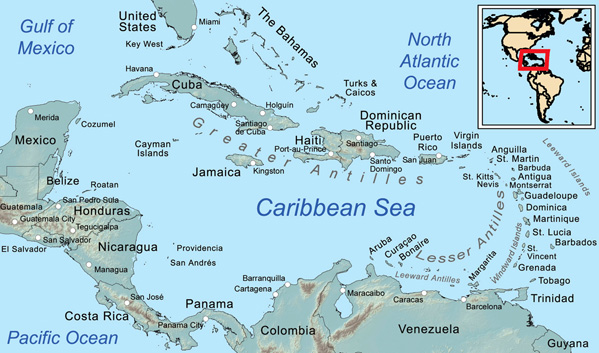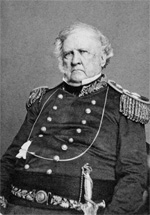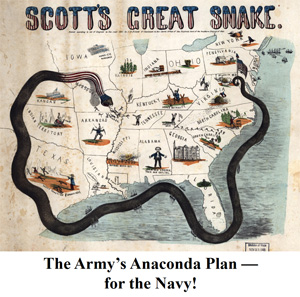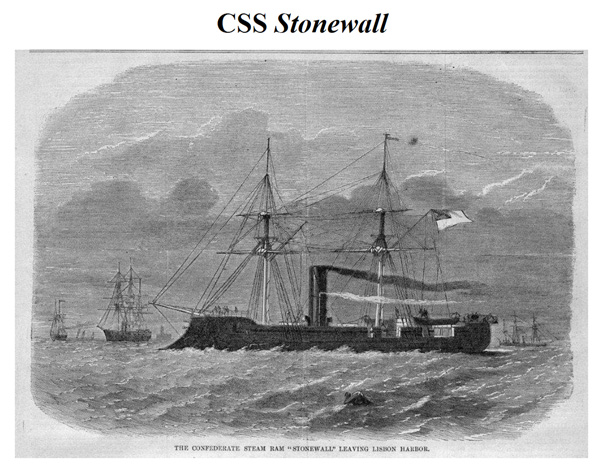
Volume 31, No. 1 – January 2018
Website:
www.CivilWarRoundTablePalmBeach.org
President’s Message:
Dues are due this month and can be paid at
the January meeting. There will be the annual election of officers
at the January meeting. Monroe Ackerman’s library of books will be
on sale at the Florida Toy Soldier and Collectibles Show, Sunday,
January 28th from 9:00AM to 3:00PM. The show is at the
Scottish Rites Hall, 2000 North “D” Street, Lake Worth. Complementary
passes will be available at the Round Table meeting.
January 10, 2018
Program:
On January 10th our
own Gerridine LaRovere will present the talk.
Her topic will be
A
Tour of Washington, D.C. during the Civil War.
Find out what Charles Dickens' thought about the city.
The streets were not paved with gold, but there was one paved
street. What were the most
important businesses in Georgetown? The city was a far different place
in the 1860s than it is now.
December 12, 2017 Program:
 For
the last 15 years Robert Macomber has been our featured speaker at the
end of the year. Most all of
the readers of this newsletter know Bob, however for the benefit of new
members here is what his publisher, the Pineapple Press, says about him. For
the last 15 years Robert Macomber has been our featured speaker at the
end of the year. Most all of
the readers of this newsletter know Bob, however for the benefit of new
members here is what his publisher, the Pineapple Press, says about him.
Robert N. Macomber is an internationally
recognized, award-winning maritime writer, lecturer, and television
commentator. He is a lecturer at
the Distinguished Military Author Series of the Center for Army Analysis
in Washington, D.C.; Caribbean/Latin American lecturer at the U.S.
Southern Command’s Notable Military Author Series; guest author, and
lecturer aboard many luxury liners; a maritime commentator for Florida
PBS; and a naval history lecturer for the American History Forum, and
the Civil War Education Association. His
lectures span 50 various maritime topics.
Mr. Macomber is the author of the acclaimed
Honor Series of naval novels and is proud to have readers in ten
countries. He also has written
many magazine articles. His
awards include the Florida Genealogy Society’s Outstanding Achievement
Award for his nonfiction work on Florida’s maritime history, the Patrick
Smith Literary Award for Best Historical Novel of Florida (At the Edge
of Honor), and the John Esten Cooke Literary Award for Best Work in
Southern Fiction (Point of Honor). He
is the guest author at regional and international book festivals and was
named by Florida Monthly magazine as one of the 22 Most Intriguing
Floridians of 2006. His sixth novel, A Different Kind of Honor, won the
highest national honor in his genre: the American Library Association’s
2008 W. Y. Boyd Literary Award for Excellence in Military Fiction.
It was awarded, along with the
$5,000 in prize money, on July 1, 2008, at the ALA’s annual convention
in Anaheim, California. Each year
Macomber travels approximately 15,000 sea miles around the globe, giving
lectures and researching his novels.
 His
presentation was titled: Blood Money, The Caribbean’s Influence on the American Civil War.
It is interesting to note that what was happening in the
Caribbean and in Europe had a major impact on the American Civil War.
Many in the old world considered the Caribbean Sea a European
“lake.” At this point Robert
diverted from his narrative to explain how Corona Beer “invented” Cinco
de Mayo to push sales in the United States.
Cinco de Mayo celebrates the unlikely victory over the French
Empire at the Battle of Puebla.
Many in the United States, and around the world, mistakenly
believe that Cinco de Mayo represents Mexico’s Independence Day
(September 16th).
Bob also pointed out that Mexico offers far better beers like Dos Equis
or Modelo. His
presentation was titled: Blood Money, The Caribbean’s Influence on the American Civil War.
It is interesting to note that what was happening in the
Caribbean and in Europe had a major impact on the American Civil War.
Many in the old world considered the Caribbean Sea a European
“lake.” At this point Robert
diverted from his narrative to explain how Corona Beer “invented” Cinco
de Mayo to push sales in the United States.
Cinco de Mayo celebrates the unlikely victory over the French
Empire at the Battle of Puebla.
Many in the United States, and around the world, mistakenly
believe that Cinco de Mayo represents Mexico’s Independence Day
(September 16th).
Bob also pointed out that Mexico offers far better beers like Dos Equis
or Modelo.
However, much more to the point, the European
powers took advantage of America’s Civil War to reinstate their
occupation of many Caribbean islands.
This is a violation of the Monroe Doctrine, a policy of the
United States since 1823. It
stated that further efforts by European nations to take control of any
independent state in North or South America would be viewed as "the
manifestation of an unfriendly disposition toward the United States."
Needless to say, the government of the Union states was in no
position to enforce same.
One of the best examples of this was the
imposition of a European-friendly government in Mexico by the French.
In 1861 France, along with England and Spain, invaded Mexico.
The French remained and in 1864 Emperor Napoleon III appointed
Fernand Maximillian to rule Mexico.
Although most European nations declared neutrality, they did
little to stop the pro-Confederate commerce of their colonies.
And, Mexico, with a long border with Confederate Texas, was an
easy point of entry and exit to the South.
There is no better example of European
behavior than the government of the United Kingdom.
Her Majesty’s government remained officially neutral throughout
the war. It legally recognized
the status of the Confederate States of America as a legitimate
belligerent, but never recognized it as a nation.
This is important because if it had not, Confederate warships
could be deemed pirates under international law.
Further, Confederate warships were given the same rights as US
warships in foreign ports.
Thus, neutral countries could trade with the South, and even build
warships for them if they adhered to certain rules.
The shipyards of England took full advantage of this as long as
the southern money continued to flow.
Only neutral Denmark resisted the urge to cash-in on the war.
A great deal of money was made during the
early years of the war when the Union navy was weak.
The South was able to export cotton and turpentine.
It was a short hop from southern ports to Caribbean ports.
You might think that in the return trips the blockade runners
might carry war cargos, but you would be wrong.
They carried luxury goods like fine soaps and spirits.
A single round trip might take a week or so and net 2,500 dollars
in gold for a sailing vessel or 5,000 dollars in gold for a steamer.
The leaders on both sides had a Caribbean
focus. Two of the southern
leaders, Judah Benjamin and Stephen Mallory were born there.
Before the war they had many contacts in the area.
While the leaders in the North were not from the Caribbean, they,
of necessity, were focused there.
 Winfield
Scott, as the senior army officer, played a major role.
Though too old and infirm to take the field, Scott served as
Lincoln's principal military advisor at the start of the war, and
conceived of the Anaconda Plan.
Though dismissed by critics, who regarded the plan's extended and
prolonged blockade of southern ports as too passive, Scott's idea was
incorporated into the overall Union strategy which brought about the
defeat of the Confederacy.
It is interesting to note that this was an army officer who established
a naval plan. Even more
ironic, the naval officer who was charged to carry it out, Gideon
Welles, was against the plan.
Welles, an irascible old coot, did indeed make it work. Winfield
Scott, as the senior army officer, played a major role.
Though too old and infirm to take the field, Scott served as
Lincoln's principal military advisor at the start of the war, and
conceived of the Anaconda Plan.
Though dismissed by critics, who regarded the plan's extended and
prolonged blockade of southern ports as too passive, Scott's idea was
incorporated into the overall Union strategy which brought about the
defeat of the Confederacy.
It is interesting to note that this was an army officer who established
a naval plan. Even more
ironic, the naval officer who was charged to carry it out, Gideon
Welles, was against the plan.
Welles, an irascible old coot, did indeed make it work.
At the start of the war the US Navy had no
officers at the rank of admiral.
The highest rank was commodore.
This was because the Congress feared the Navy would become like
the British Navy and act in a political manner.
Another reason for the lack of admirals was the size of the small
Navy. There were only 65
ships on the books and only 45 that were fit for service.
This left 12 ships to patrol 3,500 miles of southern coastline.
Welles assigned six ships to the two zones that comprised the
anaconda. The Atlantic
Blockading Squadron’s responsibilities included the eastern ports from
Chesapeake Bay to Key West, Florida. The
Gulf Blockading Squadron patrolled from Key West to the Rio Grande.
 As
time progressed and the number of ships in the blockade increased the
anaconda grew to four and then five squadrons.
By 1862 Theodorus Bailey was put in charge of the East Gulf
Blockading Squadron and given the rank of Acting Rear Admiral.
With his headquarters in Key West, Bailey’s command captured the
lion’s share of the 350 defeated blockade runners.
Due to better PR, history remembers David Farragut, commander of
the West Gulf Blockading Squadron, better than Bailey. As
time progressed and the number of ships in the blockade increased the
anaconda grew to four and then five squadrons.
By 1862 Theodorus Bailey was put in charge of the East Gulf
Blockading Squadron and given the rank of Acting Rear Admiral.
With his headquarters in Key West, Bailey’s command captured the
lion’s share of the 350 defeated blockade runners.
Due to better PR, history remembers David Farragut, commander of
the West Gulf Blockading Squadron, better than Bailey.
The effect of better patrolling meant that
the United States came into conflict with the European powers.
Queen Victoria claimed she did not know what was going on between
her industry and the sales to the Confederates.
This was in spite of numerous complaints from the US Secretary of
State. One of the key
factors in international law was how effective was the blockade.
It is not enough just to proclaim that you are blockading you
enemy. You must show that
you are actually shutting down ports.
All of the European navies tested the blockade including
land-locked Austria! By 1863
the US Navy is becoming stronger.
As blockade running is on the decline, the CSA turn to ocean
raiding to destroy the commerce of the North.
Ships like CSS Florida, built in England, have intercepted merchant ship world
wide and even off the coast of New England.
In order to increase the commerce of the
Caribbean ports, improvements are made to the physical plant of these
ports. A lighthouse is built
in Elbow Cay in the Abaco Islands of the Bahamas.
Bay Street in Nassau is lined with newly built warehouses to hold
the goods brought in by the blockade runners before they can be
transshipped in European bottoms.
These sites were boom-towns early in the war, but as the blockade
becomes more effective, thanks to the 632 new or converted Navy ships,
boom turns into bust. The
election of 1864 ends the “happy times.”
The fate of the Confederacy is sealed.
There is but one last incident to tell.
This is the tale of CSS
Stonewall.
 CSS
Stonewall, a 1390-ton ironclad ram, was built in
Bordeaux, France, for the Confederate Navy.
Actually “ironclad” was a misnomer as this ship had solid steel
sides. Embargoed by the French
government in February 1864, prior to her launching, she was
subsequently sold to Denmark. Upon
completion of her construction in late 1864, the Danish government would
not accept delivery and her builder secretly resold her to the
Confederates. In May of 1865
this formidable weapon steamed into Havana harbor.
The US Consul in Havana nearly had a fit as he knew
Stonewall was impervious to
anything the US Navy could throw at it.
The commander of the East Gulf Blockading Squadron, Admiral CK
Stribling, dispatched a detachment of 3 small warships to deal with the
rebel dreadnaught. This was
clearly a suicidal mission for the 450 men of the flotilla if there ever
was one. CSS
Stonewall, a 1390-ton ironclad ram, was built in
Bordeaux, France, for the Confederate Navy.
Actually “ironclad” was a misnomer as this ship had solid steel
sides. Embargoed by the French
government in February 1864, prior to her launching, she was
subsequently sold to Denmark. Upon
completion of her construction in late 1864, the Danish government would
not accept delivery and her builder secretly resold her to the
Confederates. In May of 1865
this formidable weapon steamed into Havana harbor.
The US Consul in Havana nearly had a fit as he knew
Stonewall was impervious to
anything the US Navy could throw at it.
The commander of the East Gulf Blockading Squadron, Admiral CK
Stribling, dispatched a detachment of 3 small warships to deal with the
rebel dreadnaught. This was
clearly a suicidal mission for the 450 men of the flotilla if there ever
was one.
For the governor of Havana, Domingo Dulce,
and the captain of Stonewall,
this was a problem. They
both knew that the South had surrendered and that this ship was now a
pirate ship if it continued to fight.
And Dulce would be charged as an accomplice to piracy if the ship
were not surrendered. So
here was the deal. Stonewall
was decommissioned and its crew paid off, with $16,000 of Spanish gold.
Dulce was paid by Stribling with $18,000 of American gold.
Everyone went away happy.
Last changed: 01/03/18
Home
About News
Newsletters
Calendar
Memories
Links Join
|

